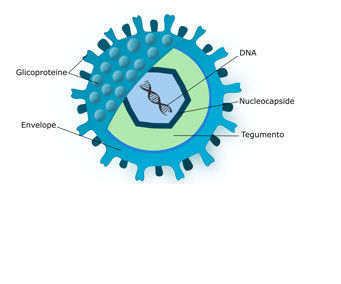
A Potential Risk Factor for Alzheimer’s Identified in the Herpes Simplex Virus
The fastidious vesicles that the Herpes Simplex Virus 1 (HSV-1) forms on lips and that are usually a lifelong nuisance had, to date, never been associated with the appearance of neurodegenerative pathologies. More specifically, little was known about the damage that the many recurrences of this infection could cause to the brain.
Now, a new study, conducted by an Italian research team coordinated by Prof. Anna Teresa Palamara at the Sapienza Department of Public Health and Infectious Diseases in the affiliated labs at the Istituto Pasteur Italia, in collaboration with the Rome CNR Translational Pharmacology Institute (Giovanna De Chiara), the Catholic University - Fondazione Policlinico A. Gemelli IRCCS (Claudio Grassi) and IRCCS San Raffaele Pisana, shed new experimental light, for the first time, on how the Herpes Simplex Virus may contribute to the onset of Alzheimer’s disease. The research project, which was funded by the Italian Ministry of Education, University and Research (PRIN 2015) and published on PLoS Pathogens, has added new understanding to research addressing the role of microbial agents in the onset of neurodegenerative diseases.
The study has revealed, in an animal model, that the repeated reactivation of the virus induces the appearance and accumulation of neurodegenerative biomarkers in the brain that are typical of Alzheimer’s disease such as beta-amyloid peptides (the main component of senile plaques), hyperphosphorylated tau proteins (that form neurofibrillary tangles) and neuro-inflammation. The accumulation of these molecular biomarkers goes hand in hand with cognitive deficits that become irreversible with an increase in the number of viral reactivations.
“The recurrence of the infamous vesicles,” explains Prof. Anna Teresa Palamara, “are caused by the virus that resides, in a latent form, in nervous cells that lie outside of the brain. Stressful conditions (such as, for example, other infections, low immunity, ultraviolet exposition, etc.) reactivate the virus and lead to the replication and spreading of the virus to the perioral region. In some subjects,” the professor adds, “the reactivated virus also reaches the brain, producing damage that accumulates over time.”
Previous studies conducted on cellular models had already demonstrated that the Herpes Simplex Virus can promote the formation of molecular neurodegeneration biomarkers. “The most interesting aspect of this study,” points out Giovanna De Chiara, “is that these results have been validated in an animal model (mice). Moreover, it reveals that the accumulation of these bio-markers is associated with a memory deficit, which is certainly a salient feature of Alzheimer’s disease.”
“However, not everyone that suffers from herpes labialis,” continues Prof. Grassi, “must fear they will suffer neuro-degeneration. Although we must wait for the results of clinical trials on humans, our research seems to suggest that, for individuals with a latent herpes infection in the brain, the repeated reactivation of the virus over the course of time represents an additional risk factor for the onset of Alzheimer’s disease. Thus, it is fundamental to understand the genetic and metabolic factors that cause the virus to reach the brain and reside there in latent form.”
“The results that we have obtained,” concludes Prof. Palamara, “point to the need to pay careful attention to the link between microbes and neurodegeneration, and to work on the development of new therapeutic and/or preventive strategies to limit the viral reactivation and the diffusion of the virus in the brain.”
References
Recurrent herpes simplex virus-1 infection induces hallmarks of neurodegeneration and cognitive deficits in mice - De Chiara, G., Piacentini, R., Fabiani, M., Mastrodonato, A., Marcocci, M. E., Limongi, D., Napoletani, G., Protto, V., Coluccio, P., Celestino. I., Li Puma, D. D., Grassi, C., Palamara A. T. - PLoS Pathogens 2019
DOI: https://doi.org/10.1371/journal.ppat.1007617
Further Information
Anna Teresa Palamara
Department of Public Health and Infectious Diseases, Sapienza University of Rome
annateresa.palamara@uniroma1.it



